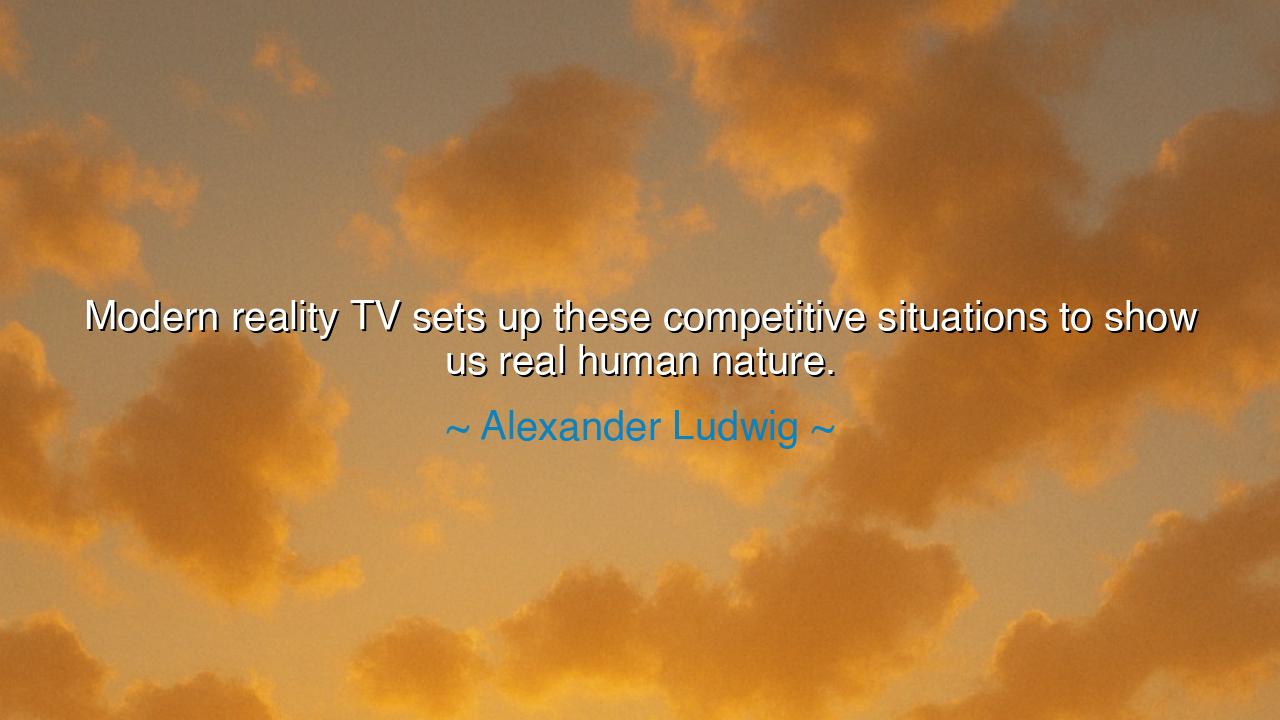
Modern reality TV sets up these competitive situations to show






Alexander Ludwig, a young actor who has looked into the mirror of fame and performance, once said: “Modern reality TV sets up these competitive situations to show us real human nature.” In this brief utterance, he points to a truth as ancient as mankind itself: that when men and women are placed in trials of competition, stripped of pretenses, the hidden workings of the heart and the raw fibers of human nature are revealed. Though the setting is new — glowing screens and staged contests — the drama is eternal.
The meaning of this quote is not merely about entertainment. Ludwig reminds us that competition is a crucible, a fiery test that exposes what lies beneath the mask. In ordinary life, people cloak themselves with manners, roles, and carefully chosen words. But when pressure builds, when resources are scarce, when victory and loss stand close at hand, then true impulses arise: envy and loyalty, greed and generosity, courage and fear. What emerges under such tension is not the mask of society, but the essence of humanity.
This lesson echoes back to the amphitheaters of ancient Rome. There, in the gladiatorial games, citizens watched as men fought for survival. Brutal though it was, such contests stripped away all illusions. In the flash of the sword, in the desperate struggle for life, true character was seen — bravery in some, cruelty in others, despair in many. Though today’s competitions are safer and staged for cameras, they still reveal the same truth: the contest unveils the soul.
Consider also the story of Ernest Shackleton’s Antarctic expedition. Stranded in the frozen wilderness, his crew faced extreme trials, and the façade of civilized life fell away. It was not wealth or fine words that sustained them, but courage, loyalty, and trust in their leader. In that crucible, the true nature of men was revealed: some faltered, some grew bitter, but many rose to heights of resilience. Shackleton himself became a living testament that in crisis, the noblest traits of humanity may be drawn forth.
Ludwig’s words warn us, however, that these competitions show both light and shadow. For human nature is not only noble; it is also selfish, fearful, and vain. Reality television reveals ambition unchecked, betrayal for gain, alliances forged and broken. It may disturb us, yet it is a mirror. To watch such contests is to see ourselves — sometimes at our worst, sometimes at our best. And this recognition, if taken with wisdom, can teach us humility and vigilance over our own impulses.
The lesson for future generations is this: do not fear the tests of life, for they will come whether you seek them or not. Instead, prepare your heart. Cultivate virtues of honesty, loyalty, and compassion, so that when the fire of competition reveals your soul, it may shine with strength rather than shame. Let every contest, whether in work, school, or life, be an opportunity to reveal not only human nature, but the higher nature within you.
Practical action flows from this truth. When you face competition, remember that it is more than a battle for prize or place; it is the unveiling of your spirit. Choose to act with integrity even when no one is watching, for the true competition is not against others but against the baser elements of yourself. Win mastery over greed, envy, and fear, and you will have triumphed in the greatest contest of all.
Thus, Alexander Ludwig’s words carry the weight of ancient wisdom in modern garb. Reality TV may appear as simple spectacle, but it reveals the same truth spoken by philosophers and warriors of old: that human nature is laid bare in trial. Let us learn, then, not to be entertained only, but to be instructed — to look into the mirror of competition, and to emerge from it more noble, more self-aware, and more deeply aligned with the best within us.






AAdministratorAdministrator
Welcome, honored guests. Please leave a comment, we will respond soon